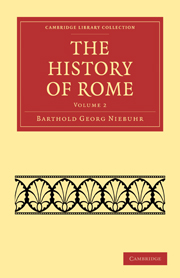Book contents
- Frontmatter
- PREFACE
- Contents
- INTRODUCTION
- The Latin State
- The League with the Latins
- Of the Colonies
- On the Rights of Isopolity and Municipium
- On the Franchise of the Latins
- The League with the Hernicans
- The Wars with the Volscians and Æquians, down to the end of the Veientine War
- The Office of Warden of the City
- The Internal Feuds of the Patricians
- Of the Public Land and its Occupation
- The Assignments of Land before the time of Sp. Cassius
- The Agrarian Law of Sp. Cassius, and his Death
- The seven Consulships of the Fabii
- The Veientine War
- Internal History from the Destruction of the Fabii to the first Pestilence
- The Legend of Coriolanus
- The Wars with the Volscians and Æquians down to the Peace of 295
- The Æquian War down to the Decemvirate
- Disasters and extraordinary Phenomena
- Civil History of the eleven Years preceding the Decemvirate
- The first Decemvirs, and their Laws
- The second Decemvirate
- The first Year after the Restoration of Freedom
- Civil Commotions down to the Constitution of 311
- The Consular Military Tribunate
- The Censorship
- Civil Affairs from the Year 311 down to the last Veientine War
- On the Pay of the Troops
- The Wars down to the Last with Veii
- The last War with Veii
- The other Wars down to that with the Gauls
- Internal History down to the War with the Gauls
- Physical History from 305 to 365
- On the Gauls, and their Immigration into Italy
- The War with the Gauls, and the Taking of Rome
- On the Olympiad and Year of the Taking of Rome
- Rome after the Departure of the Gauls
- The Wars down to the Reform of 384
- Civil History down to the Year 374
- Appendix I On the Roman Mode of Partitioning Landed Property, and on the Limitatio
- Appendix II On the Agrimensores
Rome after the Departure of the Gauls
Published online by Cambridge University Press: 01 June 2011
- Frontmatter
- PREFACE
- Contents
- INTRODUCTION
- The Latin State
- The League with the Latins
- Of the Colonies
- On the Rights of Isopolity and Municipium
- On the Franchise of the Latins
- The League with the Hernicans
- The Wars with the Volscians and Æquians, down to the end of the Veientine War
- The Office of Warden of the City
- The Internal Feuds of the Patricians
- Of the Public Land and its Occupation
- The Assignments of Land before the time of Sp. Cassius
- The Agrarian Law of Sp. Cassius, and his Death
- The seven Consulships of the Fabii
- The Veientine War
- Internal History from the Destruction of the Fabii to the first Pestilence
- The Legend of Coriolanus
- The Wars with the Volscians and Æquians down to the Peace of 295
- The Æquian War down to the Decemvirate
- Disasters and extraordinary Phenomena
- Civil History of the eleven Years preceding the Decemvirate
- The first Decemvirs, and their Laws
- The second Decemvirate
- The first Year after the Restoration of Freedom
- Civil Commotions down to the Constitution of 311
- The Consular Military Tribunate
- The Censorship
- Civil Affairs from the Year 311 down to the last Veientine War
- On the Pay of the Troops
- The Wars down to the Last with Veii
- The last War with Veii
- The other Wars down to that with the Gauls
- Internal History down to the War with the Gauls
- Physical History from 305 to 365
- On the Gauls, and their Immigration into Italy
- The War with the Gauls, and the Taking of Rome
- On the Olympiad and Year of the Taking of Rome
- Rome after the Departure of the Gauls
- The Wars down to the Reform of 384
- Civil History down to the Year 374
- Appendix I On the Roman Mode of Partitioning Landed Property, and on the Limitatio
- Appendix II On the Agrimensores
Summary
The departure of the Gauls gave the Romans nothing within the city except the desolate scene of a conflagration: and at least on the left bank of the Tiber it can only have been by accident if any house in the country had escaped destruction. The Peloponnesians in their invasions of Attica left no house and no tree standing, wherever they marcht; and the Gauls were barbarians, beneath whose tread everything living perisht. Ostia may have held out: with regard to the small Latin towns incorporated in the Roman territory, it is no less improbable that the Gauls should have refrained from attacking any place where booty was to be won, than that such places should have been able to resist them. The greatest part of the citizens had been swept away: most of the men in the prime of life fell on the Alia: an enormous number, including women and children, who could not effect their escape, must have died by the sword or been carried into slavery by the conquerors. How is it possible to believe that the Tiber can have covered the territory of Veii, at least so long as the Gallic army kept together? and many of the fugitives must have been overtaken by destruction in the very heart of Latium.
- Type
- Chapter
- Information
- The History of Rome , pp. 568 - 577Publisher: Cambridge University PressPrint publication year: 2010First published in: 1832

